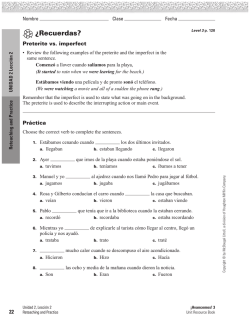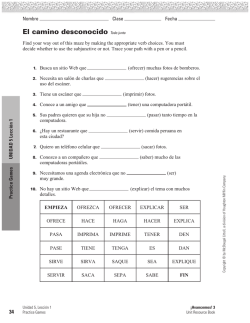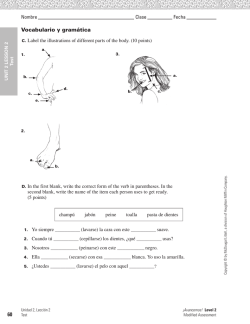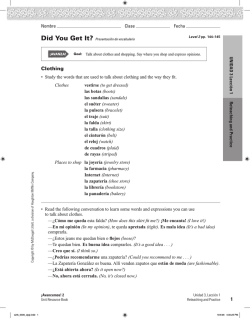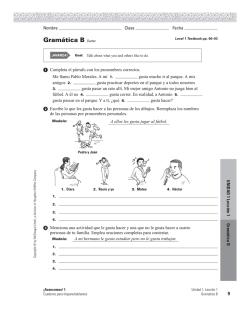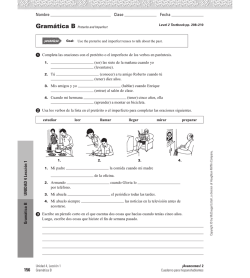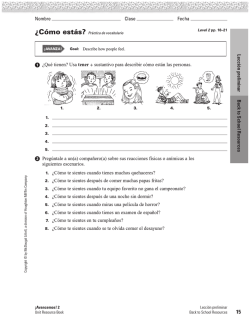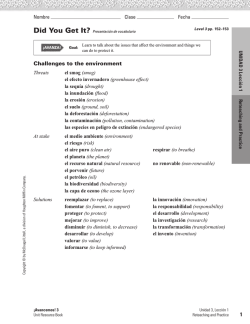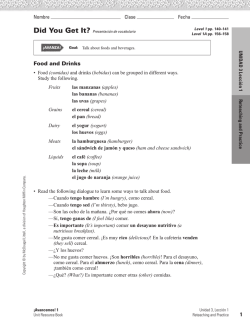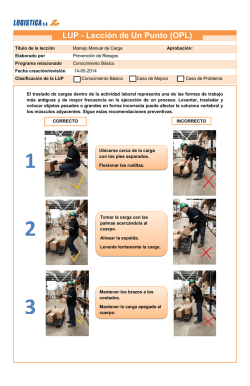
usted - SpanishBKidd
Nombre Clase Did You Get It? ¡AVANZA! Goal: Fecha Level 3 pp. 92–93 Presentación de vocabulario Talk about ways that volunteers can help in their own communities. • Study the words used to talk about volunteers, volunteer activities, and opportunities. People and places el hospital (hospital) el comedor de beneficencia (soup kitchen) el hogar de ancianos (nursing home) la cooperación (cooperation) la planificación (planning) de antemano (beforehand) el proyecto de acción social (social action project) trabajar de voluntario(a) (to volunteer) organizar (to organize) cumplir (to fulfill, to carry out) elegir (to choose) colaborar (to collaborate) reciclar (to recycle) solicitar (to ask for, to request) el lema (motto) el periódico (newspaper) la revista (magazine) el letrero (sign, poster) el diseño (design) la emisora (de radio) (radio station) la creatividad (creativity) la agencia de publicidad (ad agency) la publicidad (publicity) la campaña (campaign) el anuncio (announcement, ad) el artículo (article) la prensa (press) el canal de televisión (TV channel) Funding recaudar fondos (to raise funds) gastar (to spend) el cheque (check) el presupuesto (budget) Items la lata (metal can) la bolsa de plástico (plastic bag) los guantes de trabajo (work gloves) Copyright © by McDougal Littell, a division of Houghton Mifflin Company. Activities Getting the word out to others ¡Avancemos! 3 Unit Resource Book Unidad 2, Lección 1 Reteaching and Practice Reteaching and Practice el (la) voluntario(a) (volunteer) la gente sin hogar (homeless) los ancianos (the elderly) UNIDAD 2 Lección 1 Volunteer activities and opportunities 1 Nombre Clase Did You Get It? Goal: Level 3 p. 94 Práctica de vocabulario Talk about ways that volunteers can help in their own communities. 1 Write the word for each place or item shown. 1. 2. 3. 4. 1. 4. 2. 5. 3. 6. 5. 6. 2 Which word or phrase does not belong? 1. la campaña la prensa el lema de antemano 2. reciclar el cheque la lata la bolsa de plástico 3. trabajar de voluntario recaudar fondos el periódico solicitar 4. el anuncio la gente sin hogar la publicidad el póster 5. organizar la planificación la bolsa de plástico la cooperación 3 Match the columns to form a name or expression that makes sense. 2 1. la agencia de beneficencia 2. el comedor de plástico 3. trabajar de televisión 4. la gente de publicidad 5. recaudar sin hogar 6. el canal fondos 7. la bolsa de radio 8. la emisora de voluntario Unidad 2, Lección 1 Reteaching and Practice ¡Avancemos! 3 Unit Resource Book Copyright © by McDougal Littell, a division of Houghton Mifflin Company. Reteaching and Practice UNIDAD 2 Lección 1 ¡AVANZA! Fecha Nombre Clase Fecha 4 Choose the best response based on what each person does. 2. 3. Pablo trabaja de voluntario. a. Él lee periódicos y revistas. Lucía ayuda a los ancianos. a. Ella es directora de una agencia de publicidad. Él recicla latas y envases. b. Ella trabaja los sábados en un hogar de ancianos. b. Ellos van al hospital. 4. Mirta y yo trabajamos en una agencia de publicidad. a. Nosotras escribimos lemas y anuncios. b. Nosotras usamos guantes de trabajo. 5. Usted coopera con la planificación. a. Usted apoya a la gente sin hogar. b. Usted organiza a los voluntarios. Copyright © by McDougal Littell, a division of Houghton Mifflin Company. 5 Choose the correct word or phrase to complete the conversation. reciclar publicidad campaña revistas trabajar de voluntario lema cumple recaudar fondos cooperar comedor de beneficencia Carmela: ¿Te gustaría Rafael: Sí, ¿cómo puedo Carmela: Pensamos este sábado? ? envases y latas por la mañana. Laura: Y después ayudar a servir la comida en el . Rafael: ¿Y por qué no reciclamos también ? Carmela: Porque nuestro objetivo es . Rafael: ¿Piensan organizar alguna ? Carmela: ¡Claro que sí! La Rafael: ¿Y cuál es el Laura: «Apoya a la comunidad y Reteaching and Practice Manuel y Lara organizan una campaña. a. Ellos crean anuncios y carteles. b. UNIDAD 2 Lección 1 1. es muy importante. de la campaña? con tu deber». 6 Remember or imagine a day when you volunteered. Use vocabulary words from the lesson to write three sentences describing what you did, where, and for what purpose. 1. 2. 3. ¡Avancemos! 3 Unit Resource Book Unidad 2, Lección 1 Reteaching and Practice 3 Nombre Clase Did You Get It? Goal: Level 3 p. 97 Presentación de gramática Review affirmative and negative tú commands. Affirmative tú commands • Regular verbs Read the sentence in the left column. Then read the command in the right column. Compare the boldfaced verbs in both. Are they the same or different? Jorge recoge la basura. Jorge, ¡recoge la basura, por favor! (Jorge picks up the trash.) (Jorge, pick up the trash, please!) EXPLANATION: Regular affirmative tú commands are the same as the él / ella / usted form of the present tense. • Irregular verbs Read these sentences, paying attention to the boldfaced words. Ana pone un anuncio en la prensa. (Ana puts an announcement in the press.) Ana, ¡pon un anuncio en la prensa, por favor! (Ana, put an announcement in the press, please.) EXPLANATION: Poner has an irregular affirmative tú command. Study the other irregular affirmative tú commands in the box below. decir hacer ir poner salir ser tener venir di haz ve pon sal sé ten ven • Negative tú Commands Read the following sentences. Yo trabajo mucho. ¡No trabajes demasiado! (I work a lot.) (Don’t work too much!) EXPLANATION: Negative tú commands are formed with the yo form of verbs in the present tense. With -ar verbs, the -o ending is dropped and -es added; -er and -ir verbs add -as. If the present tense of a verb does not end with -o, the negative tú command is irregular. Study the following irregular commands in the chart below. Infinitive 4 Yo form Negative tú command dar doy no des estar estoy no estés ir voy no vayas ser soy no seas Unidad 2, Lección 1 Reteaching and Practice ¡Avancemos! 3 Unit Resource Book Copyright © by McDougal Littell, a division of Houghton Mifflin Company. Reteaching and Practice UNIDAD 2 Lección 1 ¡AVANZA! Fecha Nombre Clase Did You Get It? ¡AVANZA! Goal: Fecha Level 3 pp. 98–99 Práctica de gramática Review affirmative and negative tú commands. UNIDAD 2 Lección 1 1 Write the correct affirmative tú command for each verb. hablar 7. decir 2. abrir 8. volver 3. correr 9. venir 4. pedir 10. apoyar 5. hacer 11. oír 6. reciclar 12. tener Reteaching and Practice 1. 2 Complete each sentence with the correct negative tú command of the verb Copyright © by McDougal Littell, a division of Houghton Mifflin Company. in parentheses. 1. No me por teléfono tan temprano. (llamar) 2. No siempre lo que dice la gente. (oír) 3. No ruido cuando empiece la película. (hacer) 4. No a pie desde tan lejos. (venir) 5. No muy tarde de la fiesta. (volver) 6. No tantos dulces y helados. (comer) 7. No sin un paraguas. (salir) 8. No hacer la tarea. (olvidar) 9. No en los libros. (escribir) 10. No tan rápido. (conducir) 3 Answer the following questions using an affirmative tú command. Follow the model. Modelo: ¿Reciclo las revistas y los periódicos viejos? Sí, recicla las revistas y los periódicos viejos. 1. ¿Solicito la cooperación de una agencia? . 2. ¿Recaudo fondos para la campaña? . 3. ¿Pienso en algún lema? . 4. ¿Organizo a los voluntarios? . 5. ¿Pido guantes de trabajo nuevos? . 6. ¿Escribo un anuncio para el periódico? . 7. ¿Digo quiénes van a participar? . 8. ¿Voy casa por casa para pedir ayuda? . 9. ¿Reciclo latas y envases? . ¡Avancemos! 3 Unit Resource Book Unidad 2, Lección 1 Reteaching and Practice 5 Nombre Clase Fecha Modelo: 1. ¿Gasto todo el dinero? . 2. ¿Vuelvo a revisar la cuenta? . 3. ¿Pongo la torta en el refrigerador? . 4. ¿Duermo hasta las diez? . 5. ¿Salgo a la misma hora que ayer? . 6. ¿Contesto el teléfono? . 7. ¿Hago las maletas ahora? . 5 Translate the following sentences using an affirmative or negative tú command. 1. Come to my birthday party with your friends. 2. Don’t recycle these magazines; they are new. 3. Don’t call me before eight in the morning. 4. Put the books on the table. 5. Help Pablito do his homework. 6. Read this book; it’s very interesting. 7. Don’t say that, please. 8. Don’t eat all the chocolates! 9. Make your bed every morning. 10. 6 ¿Escribo una tarjeta postal para cada uno? No, no escribas una tarjeta postal para cada uno. Copyright © by McDougal Littell, a division of Houghton Mifflin Company. Reteaching Práctica de and Gramática Practice UNIDAD 2 Lección 1 4 Answer the following questions in the negative. Follow the model. Don’t touch the pot! It’s very hot. Unidad 2, Lección 1 Reteaching and Practice ¡Avancemos! 3 Unit Resource Book Nombre Clase Did You Get It? ¡AVANZA! Goal: Fecha Level 3 p. 102 Presentación de gramática Review usted, ustedes, and nosotros command forms. • Regular Commands Read the following usted and nosotros commands. Yo trabajo mucho. (I work a lot.) ¡No trabaje demasiado! (Don’t work too much!) Hablamos ahora. (We are speaking now.) ¡No hablemos ahora! (Let’s not speak now!) UNIDAD 2 Lección 1 Review of other command forms EXPLANATION: Use the yo form of the present tense to form the usted command. Drop the Command Forms Infinitive Copyright © by McDougal Littell, a division of Houghton Mifflin Company. solicitar traer recibir Present yo solicito yo traigo yo recibo Usted Ustedes (no) solicite (no) traiga (no) reciba (no) soliciten (no) traigan (no) reciban Nosotros (no) solicitemos (no) traigamos (no) recibamos Reteaching and Practice -o ending. Add -e to -ar verbs, and -a to -er and -ir verbs. Add -n to make the command plural. Use the nosotros form of the present tense to form the nosotros command. For -ar verbs, change -amos to -emos. For -er and -ir verbs, change -emos and -imos to -amos. To make the commands negative, simply place no in front of the verb. Study the chart below. • Irregular usted Commands Read the following usted commands. Raúl va al comedor de beneficencia. ¡Vaya al comedor de beneficencia, por favor! (Raúl is going to the soup kitchen.) (Go to the soup kitchen, please!) EXPLANATION: If the yo form of the verb in the present tense does not end with -o, this is a clue that the verb is irregular. Study these irregular command forms in the chart below. Infinitive usted ustedes dar (no) dé (no) den estar (no) esté (no) estén ir (no) vaya (no) vayan saber (no) sepa (no) sepan ser (no) sea (no) sean • Spelling Changes Read the following sentences. Busco a unos voluntarios. ¡Busque a unos voluntarios, por favor! (I am looking for some volunteers.) (Look for some volunteers, please!) EXPLANATION: Verbs ending in -car, -gar, and -zar have the same spelling changes in the usted command as in preterite tense: c qu, g gu, and z c. Infinitive buscar pagar organizar ¡Avancemos! 3 Unit Resource Book Usted (no) busque (no) pague (no) organice Ustedes (no) busquen (no) paguen (no) organicen Nosotros (no) busquemos (no) paguemos (no) organicemos Unidad 2, Lección 1 Reteaching and Practice 7 Nombre Clase Did You Get It? Goal: Level 3 pp. 103–104 Práctica de gramática Review usted, ustedes, and nosotros command forms. 1 Write the correct affirmative usted command for each verb. 1. organizar 7. ir 2. cumplir 8. saber 3. dar 9. reciclar 4. venir 10. oír 5. solicitar 11. salir 6. decir 12. apoyar 2 Write the correct affirmative ustedes command for each verb. 1. trabajar 7. llegar 2. juntar 8. leer 3. hacer 9. seguir 4. volver 10. pedir 5. dormir 11. traer 6. esperar 12. participar 3 Complete each sentence with the correct form of the usted or ustedes command of the verb in parentheses. usted más pastel si quiere, hay para todos. (comer) 1. 2. Por favor, ustedes más temprano mañana. (venir) 3. ustedes más latas en esas bolsas de plástico. (poner) 4. usted con Mireya. Ella no me quiere oír. (hablar) ustedes más bolsas: hay muchas cosas para 5. reciclar. (preparar) 6. ¡No me 7. Si no tiene dinero en efectivo, crédito. (pagar) 10. 8 usted con tarjeta de ustedes los dulces y nosotros servimos los refrescos. (servir) 8. 9. ustedes que no van a venir al concierto! (decir) ¡ No Unidad 2, Lección 1 Reteaching and Practice ustedes en la campaña, por favor! (participar) usted tanto, tenemos mucho que hacer. (dormir) ¡Avancemos! 3 Unit Resource Book Copyright © by McDougal Littell, a division of Houghton Mifflin Company. Reteaching and Practice UNIDAD 2 Lección 1 ¡AVANZA! Fecha Nombre Clase Fecha 4 Use usted commands to answer the questions, first affirmatively and then negatively. Copyright © by McDougal Littell, a division of Houghton Mifflin Company. —¿Reciclo estas revistas y periódicos? 2. —¿Sigo las instrucciones del manual de reciclaje? 3. —¿Publico el anuncio en el periódico? 4. —¿Pido ayuda a una agencia de publicidad? 5. —¿Recaudo los fondos para la campaña? 6. —¿Pago la cuenta con este cheque? Reteaching and Practice 1. UNIDAD 2 Lección 1 Replace nouns with pronouns. Modelo: —¿Llevo estos guantes de trabajo? — Sí, llévelos. — No, no los lleve. 5 You are organizing a recycling campaign. Write six sentences with affirmative or negative nosotros commands telling your team what to do. Use verbs or expressions such as trabajar de voluntario, organizar, cumplir, reciclar, recaudar fondos, apoyar, solicitar, cooperar, planificar, and any other verbs you know. 1. 2. 3. 4. 5. 6. ¡Avancemos! 3 Unit Resource Book Unidad 2, Lección 1 Reteaching and Practice 9 Nombre Clase Fecha Level 3 p. 94 ¿Recuerdas? • Review the conjugations of irregular preterite tense verbs. i-Pret. Stem Verbs hacer hic-/hiz- querer quis- venir vin- u-Pret. Stem Verbs -e -imos poder pud- estar estuv- -iste -isteis poner pus- tener tuv- -o -ieron saber j-Pret. Stem Verbs decir dijtraer traj- conducir conduj- Preterite Endings andar anduv- haber hub- uv-Pret. Stem Verbs sup- Preterite Endings dar ser and ir ver -e -imos fui di vi -iste -isteis fuiste diste viste -o -eron fue dio vio fuimos dimos vimos fuisteis disteis visteis fueron dieron vieron Copyright © by McDougal Littell, a division of Houghton Mifflin Company. Reteaching and Practice UNIDAD 2 Lección 12 Irregular preterite Práctica Use the irregular preterite to explain what these people did to volunteer. Modelo: Rosa / ir al comedor de beneficencia para servir comida Rosa fue al comedor de beneficencia para servir comida. 10 1. Miguel / traer diez pares de guantes de trabajo 2. Clara / dar una conferencia sobre reciclaje 3. Bartolo y José / conducir hasta el centro de reciclaje 4. Yo / estar en el hogar de ancianos para ayudar en la cocina 5. Isabel y tú / poner carteles sobre la campaña en la comunidad 6. Tú / hacer una buena campaña de publicidad Unidad 2, Lección 1 Reteaching and Practice ¡Avancemos! 3 Unit Resource Book Nombre Clase Fecha Level 3 p. 98 ¿Recuerdas? Family relationships Complete the sentences based on the information in the paragraph. Reteaching and Practice Práctica UNIDAD 2 Lección 1 • Review these terms that express family relationships. el padre (father) el (la) abuelo(a) (grandfather, grandmother) la madre (mother) los abuelos (grandparents) los padres (parents) el (la) nieto(a) (grandson, granddaughter) el (la) hijo(a) (son, daughter) los nietos (grandchildren) el (la) hermano(a) (brother, sister) el (la) esposo(a) (husband, wife, spouse) el (la) tío(a) (uncle, aunt) el (la) suegro(a) (father-in-law, mother-in-law) el (la) primo(a) (cousin) el yerno (son-in-law) el (la) sobrino(a) (nephew, niece) la nuera (daughter-in-law) el (la) cuñado(a) (brother-in-law, sister-in-law) Copyright © by McDougal Littell, a division of Houghton Mifflin Company. Ernesto y Leticia son los padres de Manuela y Arturo. Jorge y Victoria son hermanos de Ernesto. Celia y Zenaida son hermanas de Leticia. Raúl es hijo de Victoria. Marta y Fermín son hijos de Zenaida. Fermín tiene dos hijos, Jacinto y Zoe. Cristina es hija de Zoe. Vicente es esposo de Manuela. Paula es esposa de Arturo. 1. Raúl es el 2. Leticia es la de Marta y Fermín. 3. Ernesto es el de Vicente y Paula. 4. Jorge y Victoria son los 5. Paula es la 6. Leticia es la 7. Raúl es el 8. Vicente es el de Arturo. 9. Fermín es el de Cristina. 10. Vicente es el de Ernesto y Leticia. 11. Cristina es la de Jacinto. ¡Avancemos! 3 Unit Resource Book de Manuela y Arturo. de Manuela. de Leticia. de Vicente. de Ernesto. Unidad 2, Lección 1 Reteaching and Practice 11 Nombre Clase Fecha Level 3 pp. 99–103 ¿Recuerdas? 12 • Review these terms related to camping and beach activities. encender la fogata (to light the bonfire) escalar montañas (to go mountain climbing) hacer una caminata (to go on a hike) el chaleco salvavidas (life jacket) el voleibol playero (beach volleyball) la arena (sand) la fogata (bonfire) la moto acuática (personal watercraft) la tienda de campaña (tent) los fósforos (matches) Práctica Complete each sentence with an appropriate vocabulary word. Then rewrite each sentence as an affirmative ustedes command. Follow the model. Modelo: Patricia y Estela hacen (...) por los senderos del bosque. Patricia y Estela hacen una caminata por los senderos del bosque. ¡Hagan una caminata por los senderos del bosque! 1. Pablo y yo jugamos al (...) en las playas de Acapulco. 2. José y Felicia escalan (...) altas. 3. ¿Alguien trajo (...) para encender la fogata? 4. Los chicos cierran (...) antes de dormir. 5. Edna y Lucía se ponen (...) para conducir la moto acuática. Unidad 2, Lección 1 Reteaching and Practice Copyright © by McDougal Littell, a division of Houghton Mifflin Company. Reteaching and Practice UNIDAD 2 Lección 1 Camping and beach activities ¡Avancemos! 3 Unit Resource Book Nombre Clase Did You Get It? ¡AVANZA! Goal: Fecha Level 3 pp. 118–119 Presentación de vocabulario Learn about the different media used to communicate information. • Study the words below about newspapers and other media. Items of information Copyright © by McDougal Littell, a division of Houghton Mifflin Company. People el debate (debate) el artículo de opinión (editorial) el titular (headline) la gráfica (graphic) el grabador (tape recorder) el programa educativo (educational program) presentar (to present) publicar (to publish) describir (to describe) explicar (to explain) traducir (to translate) investigar (to investigate) patrocinar (to sponsor) entrevistar (to interview) distribuir (to distribute) estar / no estar de acuerdo (to agree / to disagree with) el (la) editor(a) (editor) el (la) fotógrafo(a) (photographer) el (la) telespectador(a) (TV viewer) el público (audience) Public support el (la) patrocinador(a) (sponsor) la obra caritativa (charitable work) a beneficio de (to the benefit of) recaudar / juntar fondos (to raise funds) la donación (donation) apoyar (to support) Other phrases la subtitulación para sordos (closed captioning for the hearing impaired) la fecha límite (deadline) ¡Avancemos! 3 Unit Resource Book Reteaching and Practice Presenting the information la(s) noticia(s) (news) el anuncio (ad, advertisement) la cuestión (issue, question) la columna (column) la reseña (review) la teletón (telethon) el volante (flyer) UNIDAD 2 Lección 2 Talk about media Unidad 2, Lección 2 Reteaching and Practice 13 Nombre Clase Did You Get It? Goal: Level 3 p. 120 Práctica de vocabulario Learn about the different media used to communicate information. 1 What is the Spanish term for . . . 1. 2. 3. 4. an editorial? el artículo de opinión el titular el volante a topic or issue? el editor la cuestión el patrocinador a book, play, or movie review? el grabador la reseña el debate an ad or advertisement? el anuncio el volante el artículo de opinión 5. a question and answer session to gain information about a person? el patrocinador el debate la entrevista 6. a title of an article or news item? la telespectadora el titular la teletón 2 Which word or phrase does not belong in the group? 14 1. el fotógrafo el editor la subtitulación para sordos 2. entrevistar donar explicar 3. el telespectador el patrocinador el público 4. traducir describir explicar 5. emitir publicar estar de acuerdo 6. recaudar fondos traducir la obra caritativa 7. la gráfica el grabador la donación 8. publicar la obra caritativa hacer algo a beneficio de alguien Unidad 2, Lección 2 Reteaching and Practice ¡Avancemos! 3 Unit Resource Book Copyright © by McDougal Littell, a division of Houghton Mifflin Company. Reteaching and Practice UNIDAD 2 Lección 2 ¡AVANZA! Fecha Nombre Clase Fecha 3 Match the columns to form expressions that make sense. de opinión 2. la fecha con una opinión 3. recaudar una teletón 4. publicar un artículo de una película 5. entrevistar la cuestión 6. no estar de acuerdo fondos 7. escribir la reseña límite 8. donar a una actriz famosa 9. investigar caritativa 10. patrocinar dinero 4 Complete the dialogues, using each expression in the box only once. un artículo de opinión el debate la reseña la cuestión un volante estoy de acuerdo los titulares la columna el periódico Copyright © by McDougal Littell, a division of Houghton Mifflin Company. 1. —¿Qué opinas sobre Carlos Fuentes? — 2. —¿Lees del último libro de con lo que dice. semanal de Lola Torres? —Sí. Ella siempre escribe 3. —¿Lees Reteaching and Practice la obra UNIDAD 2 Lección 2 1. interesante. todos los días? —Sí, pero a veces no tengo tiempo para leer todos los artículos, y leo solamente . 4. —¿Crees que debo usar para difundir mi opinión? —¿Por qué no? Es una buena manera de informar al público. 5. —¿Vemos las noticias de las ocho en el Canal 15? —No, prefiero ver que viene después. 5 Use the vocabulary you have learned in this lesson to write a brief response describing what you like to read in the newspaper and watch on TV. ¡Avancemos! 3 Unit Resource Book Unidad 2, Lección 2 Reteaching and Practice 15 Nombre Clase Did You Get It? Goal: Level 3 p. 123 Presentación de gramática Review the use of pronouns with command forms. Review of pronouns with commands • Direct and Indirect Object Pronouns Read the following sentences. Compra el libro. (Buy the book.) Cómpralo. (Buy it.) No le expliques la lección. (Don’t explain the lesson to him.) No se la expliques. (Don’t explain it to him.) EXPLANATION: In Spanish, the placement of pronouns depends on whether the command is affirmative or negative. In affirmative commands, the pronouns are attached to the end of the command. In negative commands, they go before the verb and after no. Remember that if both object pronouns begin with l, the indirect object pronoun changes to se. • Reflexive Pronouns Read the following sentences. Lávate las manos. (Wash your hands.) Lávatelas. (Wash them.) No te laves el pelo. (Don’t wash your hair.) No te lo laves. (Don’t wash it.) EXPLANATION: When using the command form of a reflexive verb with an object pronoun, the reflexive pronoun comes before the object pronoun. • Pronouns with Nosotros Commands Read these sentences. Organicemos una campaña. (Let’s organize a campaign.) Organicémonos. (Let’s organize ourselves.) Ayudemos a todos los editores. (Let’s help all the editors.) Ayudémonos. (Let’s help ourselves / each other / one another.) EXPLANATION: With the nosotros command, the -s of the ending is dropped before adding the reflexive pronoun nos. 16 Unidad 2, Lección 2 Reteaching and Practice ¡Avancemos! 3 Unit Resource Book Copyright © by McDougal Littell, a division of Houghton Mifflin Company. Reteaching and Practice UNIDAD 2 Lección 2 ¡AVANZA! Fecha Nombre Clase Did You Get It? ¡AVANZA! Goal: Fecha Práctica de gramática Level 3 pp. 124–125 Review the use of pronouns with command forms. UNIDAD 2 Lección 2 1 Write the following affirmative commands with pronouns in Spanish. Call him! (tú) 2. Invite her! (usted) 3. Talk to me! (ustedes) 4. Wait for us! (usted) 5. Help them (fem.)! (tú) 6. Tell me! (usted) 7. Count them (masc.)! (ustedes) 8. Read it! (el libro) (tú) Reteaching and Practice 1. Copyright © by McDougal Littell, a division of Houghton Mifflin Company. 2 Write the following negative commands with pronouns in Spanish. 1. Don’t call him! (ustedes) 2. Don’t invite her! (tú) 3. Don’t talk to me! (tú) 4. Don’t wait for us! (ustedes) 5. Don’t help them (fem.)! (usted) 6. Don’t tell me! (ustedes) 7. Don’t count them (masc.)! (tú) 8. Don’t read it! (el libro) (usted) 3 Write the following affirmative tú commands with double pronouns in Spanish. 1. Send it to us! (la carta) 2. Explain it to me! (el artículo de opinión) 3. Buy them for them (masc.)! (los juguetes) 4. Show it to him! (el libro) 5. Say it to her! 6. Keep them for me! (las invitaciones) 7. Lend it to us! (la pelota) 8. Give it to him! (el dinero) ¡Avancemos! 3 Unit Resource Book Unidad 2, Lección 2 Reteaching and Practice 17 Nombre Clase Fecha 4 Write the following negative usted and ustedes commands with double pronouns 18 1. Don’t send it to us! (la carta) (usted) 2. Don’t explain it to me! (el artículo de opinión) (ustedes) 3. Don’t buy them for them (masc.)! (los juguetes) (ustedes) 4. Don’t show it to him! (el libro) (usted) 5. Don’ t say it to her! (usted) 6. Don’t keep them for me! (las invitaciones) (ustedes) 7. Don’t lend it to us! (la pelota) (ustedes) 8. Don’t give it to him! (el dinero) (usted) 5 Answer the questions, first affirmatively and then negatively. Replace nouns with pronouns. Modelo: —¿Me lavo las manos? (tú) — Sí, lávatelas. — No, no te las laves. —¿Escribimos el artículo? (nosotros) — Sí, escribámoslo. — No, no lo escribamos. 1. —¿Donamos el dinero? (nosotros) 2. —¿Patrocino la teletón? (usted) 3. —¿Me corto el pelo? (tú) 4. —¿Enviamos la carta al director del periódico? (nosotros) 5. —¿Me pinto las uñas? (tú) 6. —¿Publico la reseña? (tú) Unidad 2, Lección 2 Reteaching and Practice Copyright © by McDougal Littell, a division of Houghton Mifflin Company. Reteaching and Practice UNIDAD 2 Lección 2 in Spanish. ¡Avancemos! 3 Unit Resource Book Nombre Clase Did You Get It? ¡AVANZA! Goal: Fecha Level 3 p. 128 Presentación de gramática Review the use of impersonal expressions with infinitives. • Read the following sentences, paying attention to the impersonal expressions and what follows them. Es importante leer los periódicos para estar bien informado. (It is important to read the newspapers to be well-informed.) UNIDAD 2 Lección 2 Review of impersonal expressions + infinitives Reteaching and Practice Fue bueno conocer diferentes puntos de vista sobre una misma cuestión. (It was good to know different points of view on the same question.) Va a ser interesante trabajar en el periódico. (It is going to be interesting to work on the newspaper.) Va a ser difícil publicar esa reseña. (It is going to be difficult to publish that review.) EXPLANATION: An impersonal expression is used to state an opinion, or to suggest Copyright © by McDougal Littell, a division of Houghton Mifflin Company. that something should be done without indicating who should do it. An infinitive is added to the impersonal expression to say what should be done. • Study the following chart to review several impersonal expressions. Form of ser Es Fue Era + Va a ser Adjective bueno difícil fácil importante imposible interesante malo mejor necesario posible útil EXPLANATION: Impersonal expressions combine the él / ella / usted form of the verb with ser + adjective. ¡Avancemos! 3 Unit Resource Book Unidad 2, Lección 2 Reteaching and Practice 19 Nombre Clase Did You Get It? Goal: Level 3 pp. 129–130 Práctica de gramática Review the use of impersonal expressions with infinitives. 1 Determine which of the following statements is Cierto (C) and which is Falso (F) for a person who wants to be well-informed. 1. Es útil ver programas educativos en la televisión. C F 2. Es necesario leer todo tipo de publicidad por correo. C F 3. Es indispensable trabajar como fotógrafo en un periódico. C F 4. Es importante leer columnas y artículos de opinión. C F 5. Es malo escuchar diferentes opiniones en un debate. C F 6. Es bueno leer reseñas de libros y películas. C F 7. Es interesante leer entrevistas a gente famosa. C F 8. Es importante publicar anuncios clasificados. C F 2 Complete the following sentences with an appropriate impersonal expression from the box. Use each expression only once. es bueno es importante es muy útil es imposible es malo es necesario es posible es indispensable leer cada día todos los periódicos que se publican 1. en Estados Unidos. 2. saber distinguir entre un hecho y una opinión. 3. conocer muy bien un idioma extranjero para poder traducirlo. 20 4. saber explicar bien nuestra opinión. 5. patrocinar una teletón sin recaudar dinero. 6. no respetar las fechas límites. 7. recaudar fondos para obras caritativas. 8. tomar buenas fotos para el periódico. Unidad 2, Lección 2 Reteaching and Practice ¡Avancemos! 3 Unit Resource Book Copyright © by McDougal Littell, a division of Houghton Mifflin Company. Reteaching and Practice UNIDAD 2 Lección 2 ¡AVANZA! Fecha Nombre Clase Fecha It is important to read newspapers and watch the news. 2. It is not necessary to read all the articles in a newspaper. 3. It is very interesting to read book and film reviews. 4. It is very easy to learn Spanish. 5. It is impossible to sponsor a festival without raising money. 6. It is a good idea to participate in charitable work. 7. It is interesting to watch debates to know different opinions. 8. It is possible to speak many different languages. 9. It is a bad idea to think that all the information is in the headlines. 10. Reteaching and Practice 1. UNIDAD 2 Lección 2 Copyright © by McDougal Littell, a division of Houghton Mifflin Company. 3 Translate the following sentences into Spanish. It is better to read all of the article. 4 You and some friends are organizing a campaign to get young people to read more and pay more attention to current events. Write six sentences to express your ideas about what is necessary to fulfill your goals. Use expressions such as es importante, necesario, útil, bueno, malo, posible, imposible, indispensable, preferible (preferable), es una buena (mala) idea, followed by an infinitive. 1. 2. 3. 4. 5. 6. ¡Avancemos! 3 Unit Resource Book Unidad 2, Lección 2 Reteaching and Practice 21 Nombre Clase Fecha Level 3 p. 120 ¿Recuerdas? • Review the following examples of the preterite and the imperfect in the same sentence. Comenzó a llover cuando salíamos para la playa, (It started to rain when we were leaving for the beach.) Estábamos viendo una película y de pronto sonó el teléfono. (We were watching a movie and all of a sudden the phone rang.) Remember that the imperfect is used to state what was going on in the background. The preterite is used to describe the interrupting action or main event. Práctica Choose the correct verb to complete the sentences. 1. Estábamos cenando cuando los dos últimos invitados. a. llegaban b. estaban llegando c. llegaron 2. Ayer a. tuvimos 3. Manuel y yo a. jugamos 4. Rosa y Gilberto conducían el carro cuando a. veían b. vieron 5. Pablo a. recordó 6. Mientras yo policía y nos ayudó. a. trataba 7. a. 22 al ajedrez cuando nos llamó Pedro para jugar al fútbol. b. jugaba c. jugábamos la casa que buscaban. c. estaban viendo que tenía que ir a la biblioteca cuando la estaban cerrando. b. recordaba c. estaba recordando de explicarle al turista cómo llegar al centro, llegó un b. trato c. traté mucho calor cuando se descompuso el aire acondicionado. Hicieron b. Hizo c. Hacía 8. a. que irnos de la playa cuando estaba poniéndose el sol. b. teníamos c. íbamos a tener Son Unidad 2, Lección 2 Reteaching and Practice las ocho y media de la mañana cuando dieron la noticia. b. Eran c. Fueron ¡Avancemos! 3 Unit Resource Book Copyright © by McDougal Littell, a division of Houghton Mifflin Company. Reteaching and Practice UNIDAD 2 Lección 2 Preterite vs. imperfect Nombre Clase Fecha Level 3 p. 125 ¿Recuerdas? Beach activities UNIDAD 2 Lección 2 Reteaching and Practice • Review the list of words about the beach and beach activities. la arena (sand) recoger caracoles (to pick up shells) el voleibol playero (beach volleyball) recostarse (to lie down) el calor agobiante (stifling heat) marearse (to get seasick, to become dizzy) el chaleco salvavidas (life jacket) mantener el equilibrio (to keep your balance) la cubierta (boat deck) refrescarse (to cool down) la moto acuática (personal watercraft) hacer fresco (to be cool [weather]) la tabla de surf (surfboard) pararse (to stand up) el (la) surfista (surfer) navegar (to sail) la orilla (shore) la puesta del sol (sunset) la sombrilla (parasol) la brisa (breeze) Práctica Copyright © by McDougal Littell, a division of Houghton Mifflin Company. 1 Match the columns to form expressions or phrases that make sense. 1. mantener el equilibrio el chaleco salvavidas 2. recoger caracoles bajo la sombrilla 3. navegar por la brisa 4. recostarse en la orilla 5. refrescarse al voleibol playero 6. ponerse en la tabla de surf 7. hace fresco cuando hace un calor agobiante 8. pararse en la moto acuática 9. jugar desde el barco ver la puesta de sol en la arena 10. 2 Write five sentences describing what you and others like to do at the beach. 1. 2. 3. 4. 5. ¡Avancemos! 3 Unit Resource Book Unidad 2, Lección 2 Reteaching and Practice 23 Nombre Clase Fecha Level 3 p. 129 ¿Recuerdas? • Review the list of words about volunteering. trabajar de voluntario (to volunteer) organizar (to organize) cumplir (to fulfill, to carry out) reciclar (to recycle) recaudar (to raise funds) apoyar (to support) solicitar (to ask for, to request) la cooperación (cooperation) la planificación (planning) de antemano (beforehand) la bolsa de plástico (plastic bag) el comedor de beneficencia (soup kitchen) la lata (can) los guantes de trabajo (work gloves) el hospital (hospital) el hogar de ancianos (nursing home) Práctica Complete the sentences with appropriate vocabulary terms. 1. Para latas es bueno tener bolsas de plástico. 2. Se puede reciclar papel y . 3. Trabajar de voluntario es con tu deber social. 4. Recaudar fondos es 5. Un lugar de la comunidad donde se puede ayudar a la gente que no tiene comida es . 6. Planificar significa preparar algo 7. La señora Ramírez tiene ochenta años y vive en dinero para una actividad. . de la comunidad. 8. Para recoger cosas sucias es bueno usar 9. Mi tío Armando es médico y es el director del de la comunidad. 10. 24 Es muy importante organizar voluntarios de toda la comunidad. Unidad 2, Lección 2 Reteaching and Practice . entre los ¡Avancemos! 3 Unit Resource Book Copyright © by McDougal Littell, a division of Houghton Mifflin Company. Reteaching and Practice UNIDAD 2 Lección 2 Volunteer activities
© Copyright 2026
